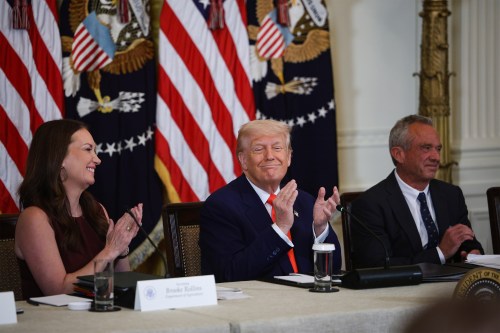The Trump administration recently issued a manifesto on what’s wrong with health in America, but many of its actions clash with its answers.
Scientists and public health advocates see deep disconnects between what the administration has said about health — notably, in “The MAHA Report,” which President Donald Trump recently presented at the White House — and what it’s actually doing.
For instance, the report says more research is needed on chronic diseases and the cumulative effects of chemicals in the environment. But the Trump administration’s mass cancellation of federal research grants has derailed studies on those subjects.
The report denounces industry-funded research on chemicals and health as widespread and unreliable. But the administration is seeking to cut government funding that could serve as a counterweight.
“There are many inconsistencies between rhetoric and action,” said Alonzo Plough, chief science officer at the Robert Wood Johnson Foundation, a philanthropy focused on health.
The report, a cornerstone of President Donald Trump’s “Make America Healthy Again” agenda, was issued by a commission composed of Health and Human Services Secretary Robert F. Kennedy Jr. and other top administration officials.
It quickly became famous for footnoting nonexistent sources and containing signs that it was produced with help from artificial intelligence. White House press secretary Karoline Leavitt described the problems as “formatting issues,” and the administration revised the report.
Spokespeople for the White House and Department of Health and Human Services did not respond to questions for this article.
For a glimpse of the bigger picture, consider the case of the poopy diapers.
The MAHA Report says environmental chemicals may pose risks to children’s health — that the nation needs “to better understand the cumulative load of multiple exposures and how it may impact children’s health.”
The Environmental Protection Agency was thinking along the same lines in 2020 when it asked scientists to propose ways of researching children’s exposure to chemicals from soil and dust. It said that, for young kids, ingesting particulates — by putting their hands on the ground or floor then in their mouths — could be a significant means of exposure to contaminants such as herbicides and pesticides.
One grant went to a team of scientists at Johns Hopkins University and the University of California-San Francisco. Researchers gained permission to collect samples from people’s homes, including dust and diapers.
But, beyond a small test run, they didn’t get to analyze the urine and stool samples because the grant was terminated this spring, said study leader Keeve Nachman, a professor of environmental health and engineering at Johns Hopkins.
“The objectives of the award are no longer consistent with EPA funding priorities,” the agency said in a May 10 termination notice.
‘MAHA Report’ Calls for Fighting Chronic Disease, but Trump and Kennedy Have Yanked Funding
Scientists and public health advocates see disconnects between what the Trump administration says about health — notably, in its “MAHA Report” — and what it’s actually doing.
Read More






